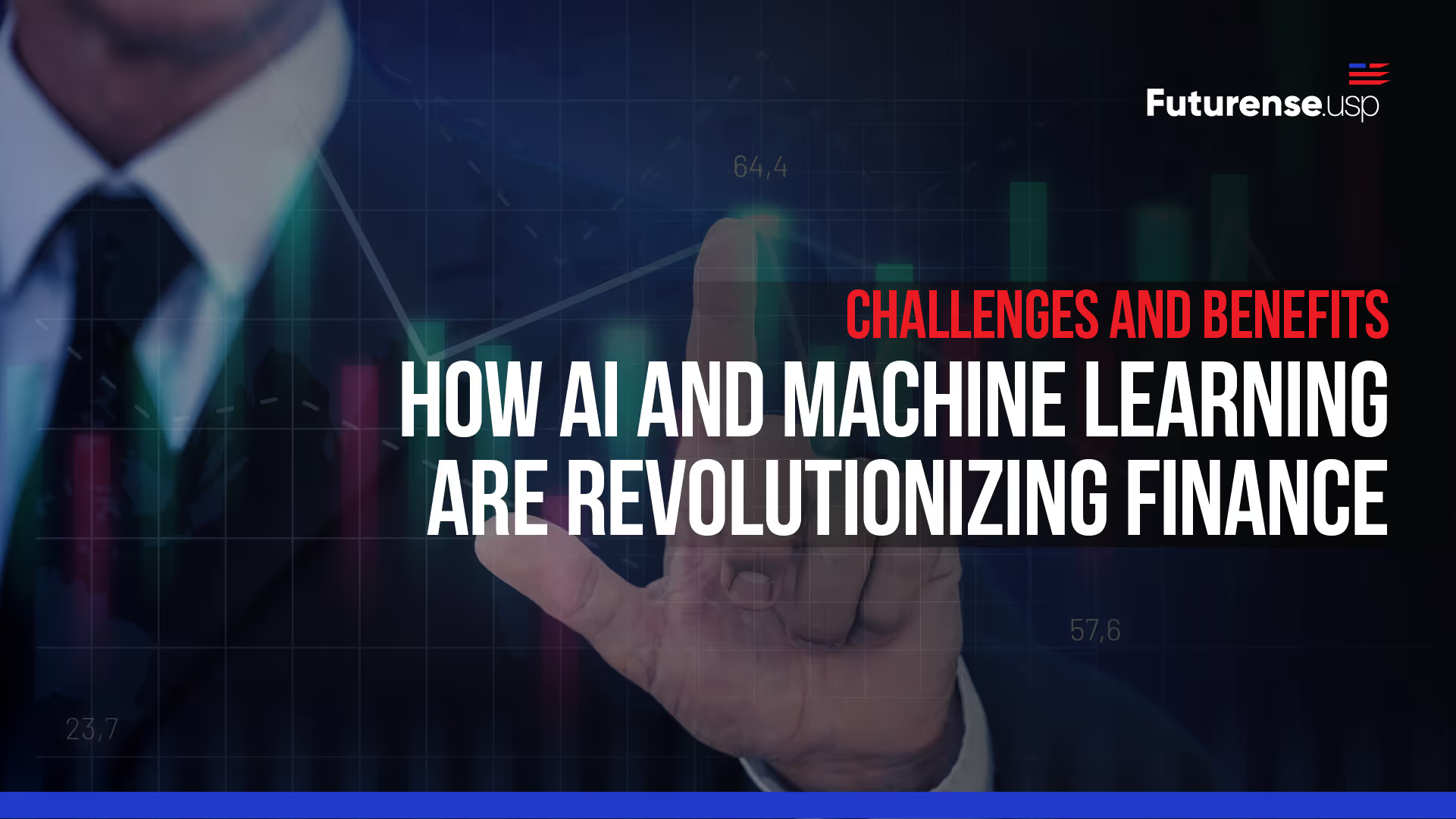If you thought that artificial intelligence and machine learning are only used in the tech industry, then you couldn't be farther from the truth. In recent years AI and ML are playing a huge role in reshaping all industries worldwide and the financial sector is no exception.
In India and globally, AI and ML have emerged as transformative tools that are changing how the financial sector works. ML and AI in the finance industry are being used for everything from risk management to customer service. The use of these two innovative technologies has created a more efficient, secure and personalized financial system. But as with anything, AI and machine learning in finance come with their own set of challenges. So, in this article let's take a look at how ML and AI are transforming the finance industry highlighting both the benefits and challenges of their adoption.
How The Finance Industry Is Using AI
If you think carefully, AI and ML are inherently similar to the finance industry because both of them are data-driven. Hence it is easy for these two technologies to use the algorithms and vast data set that is present in the financial sector to automate its processes, predict industry trends, and derive actionable insights. Here are some key areas where AI and ML have impacted the finance industry:
Fraud Detection and Risk Management
One of the foremost ways AI and ML are being used in the finance industry is for fraud detection. Like everything else, fraudsters in the financial industry have evolved dramatically in recent years. Traditional fraud detection systems, which rely on predefined rules, are unable to tackle these new-age fraudsters. However, ML and AI-powered finance solutions can analyze the vast amount of transaction data in real-time, hereby identifying anomalies within seconds and flagging them. One good example is the use of AI-powered tools in many Indian banks to detect credit card fraud.
Risk management is another important aspect of the financial industry. Models made with AI in risk management make it easier to assess market trends and evaluate creditworthiness quickly. ML algorithms can analyze historical data and patterns and provide more secure risk assessments which help financial institutions to make informed decisions.
Enhancing Customer Experience
One of the first uses of AI in finance was the creation of AI-powered chatbots and virtual assistants. These have revolutionised how the financial sector services its customers. Leading Indian banks like HDFC and ICICI have deployed such AI chatbots that provide instant responses to customer queries, offer personalized solutions and even recommend financial products. These chatbots and virtual assistants have increased customer satisfaction and also reduced the response time in the financial sector.
While AI is being used to power chatbots and virtual assistants, machine learning in finance is being used to provide personalized customer services. ML can easily analyze customer data, enabling banks to offer tailored investment advice and credit options. They also have an insight into the spending habits of their customers which can help them make better personalized offerings.
Algorithmic Trading
Algorithmic or algo trading uses AI and ML to execute trades based on pre-defined criteria. These systems analyze market data and execute transactions faster and more efficiently than human traders. In India, the National Stock Exchange (NSE) has seen a rise in algo trading, as brokers and investors use AI in financial analysis to provide high-frequency trading.
Credit Scoring and Lending
Even in 2024, a significant portion of the population in India remains unbanked. This means that there are individuals who can’t be offered services because traditional credit scoring models use formal credit histories to offer solutions. But AI and ML can be used for analyzing alternative data available like their utility payment histories or their social media activities to find their creditworthiness.
Portfolio Management
Financial institutions are increasingly using AI-powered finance solutions to manage their investments, especially portfolio management. Such tools make it easy to create investment portfolios for individuals as they use algorithms to find the best options based on the customer's financial goals and risk appetite. Robo-advisors like these have made financial advice affordable and accessible to more people than before.
Benefits of AI and ML in Finance
So, these are some of the ways ML and AI are transforming the finance industry. Now, let’s take a look at the benefits of this transformation.
Improved Efficiency
AI and ML have taken over repetitive tasks like document verification and compliance checks freeing up human resources. This automation has not only led to cost savings but increased productivity as the human resource is now free to do other work.
Enhanced Decision-Making
AI also helps financial institutions make better decisions because they provide data-driven insights. Moreover, they provide predictive analytics which helps to forecast market trends, identify investment opportunities that can be profitable and also avoid risks.
Greater Accuracy
Many financial losses happen due to human error. By using AI in the finance industry, these mistakes can be avoided as the tools will automate calculations and processes, ensuring greater accuracy in operations.
Financial Inclusion
With machine learning in financial regulation and other aspects, financial industries can leverage alternative data for credit assessments. This helps them extend services to underserved populations, enhancing financial inclusion.
Real-Time Processing
The market can change in an instant, and AI-powered financial systems can process data and transactions in real-time to respond effectively. This will help institutions to provide the best response to changing market conditions and avoid potential threats.
Challenges of AI and Machine Learning in the Finance Industry
Despite their immense potential, the integration of AI and ML in finance is not without challenges:
Data Privacy and Security
A lot of sensitive financial data will be used by AI and ML-powered tools. This naturally raises concerns about privacy and security because a cyberattack on such AI systems can lead to data breaches. That ultimately leads to lowered customer trust.
Ethical Concerns
AI decision-making can raise ethical concerns as it lacks transparency, which is called the “black box” problem. This arises from biases that can be there in training data which can lead to unfair outcomes in areas like credit scoring.
High Implementation Costs
It is a significant investment for a financial institute to implement AI-powered finance solutions. They have to invest in technology, talent as well as infrastructure. For smaller financial institutions, it can be quite costly.
Regulatory Challenges
AI applications in finance must comply with stringent regulations to prevent misuse. In India, the Reserve Bank of India (RBI) has issued guidelines for AI adoption, but navigating regulatory frameworks remains complex.
Workforce Displacement
It is true that machine learning in finance can open up new jobs, but it is equally true that some jobs are in danger. This is why people working in the industry must adapt by upskilling in AI and data analytics. This is why programs like the Futurense US Pathway are ideal for working professionals seeking to upgrade their skills.
It offers a pathway to pursue an MS in AI and ML from US institutions through a flexible pathway program.
Conclusion
As India continues to position itself as a global leader in fintech, the role of ML and AI in the finance industry will be instrumental in shaping the future of finance. Embracing these technologies today will ensure a competitive edge in the ever-changing financial landscape.
How are AI and Machine Learning being used in the finance industry?
AI and Machine Learning (ML) are being used across various sectors of finance, including fraud detection, algorithmic trading, credit scoring, customer service (chatbots), and risk management. AI helps analyze vast amounts of data quickly, allowing financial institutions to make more accurate predictions and decisions. Machine learning models can identify patterns in financial data that humans might miss, which leads to improved efficiency and enhanced decision-making.
What are the main benefits of AI and ML for financial institutions?
Some key benefits include increased operational efficiency, cost reduction, enhanced customer experiences, and better risk management. AI algorithms can quickly analyze large datasets, making it easier for banks to spot fraudulent activities or assess a customer's creditworthiness. Furthermore, AI can automate many routine processes, reducing human error and operational costs, while delivering more personalized financial services to clients.
What are the challenges in implementing AI and ML in the finance sector?
Challenges include data privacy concerns, high initial investment costs, integration with existing systems, and a lack of skilled professionals in AI and ML fields. Financial institutions also face challenges in ensuring the fairness and transparency of algorithms, as AI/ML models can sometimes produce biased results. Additionally, regulatory compliance is a major concern, as many financial institutions must navigate complex legal frameworks while adopting AI solutions.
How does AI and ML improve fraud detection in financial transactions?
AI and ML models can detect suspicious patterns and anomalies in real-time, which helps prevent fraud. These models analyze historical data from millions of transactions and can learn to identify behaviors or activities that deviate from the norm. When such deviations are detected, the system can flag the transaction for further review, significantly reducing fraud risks and minimizing financial losses.
Will AI and ML replace human jobs in the finance industry?
While AI and ML are automating certain tasks, they are more likely to augment human roles rather than replace them entirely. Many routine and repetitive tasks, such as data entry or simple analysis, can be handled by machines, but complex decision-making, creative problem-solving, and customer relationship management still require human expertise. The key is for financial professionals to adapt by gaining skills that complement AI technologies, ensuring they remain valuable in an AI-powered workforce.








.avif)